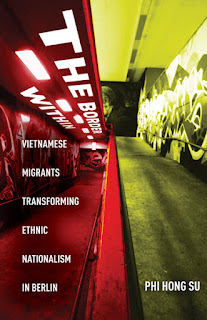 Division of Social Science at New York University Abu Dhabi.
Division of Social Science at New York University Abu Dhabi.
She applied the “Page 99 Test” to her new book, The Border Within: Vietnamese Migrants Transforming Ethnic Nationalism in Berlin, and reported the following:
Page 99 finds us attending a cultural night hosted by Friendship and Adventure (FaA), a Berlin-based organization composed of migrants predominantly from northern Vietnam. Three of the attendees—myself included—are from southern Vietnam. People use these regional labels as shorthand, assuming that northerner = communist = contract worker to East Germany, and southerner = anticommunist = refugee to West Germany. Yet Mỹ Linh's biography should give us pause about the accuracy of these shorthands:Visit Phi Hong Su's website.As the only young adults present, Kim and I serve desserts and take numerous group photos for FaA members. By 6:00 p.m., however, Kim is itching to go. I had told her earlier that I would leave with her. We gather our belongings and bid the elders farewell as songs continue to play in the background. Midway through one song, Anh runs up to Kim, Mỹ Linh, and me, and whispers indignantly: "It's red music!" (Là bản đỏ đó). Mỹ Linh nods disdainfully, decides she has tolerated the event long enough, and exits with us.This page does a good job of capturing my key concern: How do people rebuild their lives after surviving war, migrating internationally, and experiencing states rise and fall? For my interlocutors, the idea of the "nation" shaped how they understood their opportunities at work, how they practiced religion, and, in the chapter that page 99 is part of, how they initiate and maintain friendships.
Mirroring my first time at FaA with Hồng, Mỹ Linh rages against northerners as we approach our bus stop. A southerner, she explains that she came to East Germany at a very young age as a contract worker. Mỹ Linh claims she did not know much about politics at the time. She did not differentiate between north and south during her youth, she explains, as she met few northerners in her southern hometown. But she learned about the politics of north and south on German soil. In particular, Mỹ Linh became socialized into the southern refugee stance of mistrusting northerners after the fall of the Berlin Wall. Despite her contract worker background and willingness to share the same physical space with northerners, Mỹ Linh's mistrust of northerners leads her to openly disparage them.
The concerns of northerners such as Phong, as well as the experiences of southerners such as Anh and Mỹ Linh, highlight how people from opposite regions of Vietnam experienced reunification asymmetrically. Vietnamese reunification under the direction of the North means that these symbols have become a form of "banal nationalism" for northerners. As the North's vision of a reunified Vietnam actualized, its accompanying changes became taken for granted, including the renaming of Saigon as Ho Chi Minh City. Yet the mention of Hồ Chí Minh reminds southerners of what they see as the occupation of the South. Anh and Mỹ Linh take offense at a city name to which the northerners in the room had become accustomed. To those who lament the outcome of reunification, the same symbols represent objects of hot nationalism.
The exchange with Mỹ Linh also suggests that folks can become socialized into exile politics after leaving a homeland. And even those born after the end of the Vietnam War become absorbed into these divisions of north and south. Kim, for example, had moved from central Vietnam to Germany for her studies a few months before this FaA event. While growing up, she had never heard of "re-education camps," where many southerners considered enemies of the state were imprisoned after 1975. By the end of my fieldwork in Berlin, Kim would find herself sorted into these divisions.
The scene on page 99 is building to a key point: even as folks unquestionably believe in their shared Vietnamese nationhood, they don't think this means they need to belong to the same nation-state. Decades after the reunification of Vietnam, my interlocutors have come to reject the politics of ethnic nationalism.
As an exercise in analytically informed storytelling, this book is centrally concerned with conveying scenes from everyday life. (See, for example, the book trailer and the preface.) I hope readers will find the protagonists compelling and the prose inviting. And I hope to engage with folks about the book's main thrust: even though we're repeatedly confronted with these protagonists' profoundly felt sense of ethnic nationhood, we also glean that they've left the politics of ethnic nationalism behind.
--Marshal Zeringue